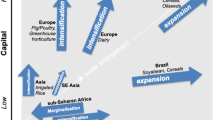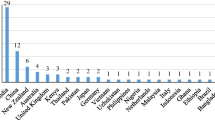Abstract
An analysis of social goals for agriculture presupposes an account of systematic interactions among economic, political, and ecological forces that influence the performance of agriculture in a given society. This account must identify functional performance criteria that lend themselves to interpretation as normative or ethical goals. Individuals who act within the system pursue personal goals. Although individual acts and decisions help satisfy functional performance criteria, individuals may never conceptualize or understand these criteria, and, hence, social goals for agriculture may not be intentionally sought or desired by any human being. The statement of social goals is not, therefore, reducible to statements about individual desires and preferences, and the validity of social goals does not depend upon deriving a social welfare function, nor upon measuring interpersonal utility.
The paper examines a series of strategies for defining social goals for agriculture, beginning with the statement of goals offered by William Aiken in 1983. Aiken's view stresses individually based constraints upon action, but social goals cannot be adequately defined on this view. Successively more adequate approaches to the problem of social goals are examined with respect to production and efficiency, Jeffersonian democracy, and ecosystem goals of community and self-reliance. The role of family farms, and the change in farm structure is evaluated in light of this analysis for social goals.
Similar content being viewed by others
References Cited
Aiken, W. 1978. The Right to Be Saved From Starvation,World Hunger and Moral Obligation W. Aiken & H. LaFollette, Eds., Englewood Cliffs, NJ: Prentice-Hall.
Aiken, W. 1984a. The Goals of Agriculture,Agriculture Change, and Human Values R. Haynes & R. Lanier, Eds., Gainesville, FL: The Humanities and Agriculture Program, The University of Florida; 29–54.
Aiken, W. 1984b. Ethical Issues in Agriculture,Earthbound T. Regan, Ed., New York: Random House.
Batie, S. 1984.Soil Conservation Policy for the Future, The Farm and Food System in Transition 23 Cooperative Extension Service, Michigan State University, East Lansing, MI.
Berry, W. 1978.The Unsettling of America San Francisco: Sierra Club Books.
Bonnen, J. 1983. “Historical Sources of U.S. Agricultural Productivity: Implications for R&D Policy and Social Science Research,”American Journal of Agricultural Economics 65 (5), 958–966.
Cowan, R. S. 1983.More Work For Mother New York: Basic Books.
Emerson, R. W. 1904. “Farming,”The Complete Works of Ralph Waldo Emerson Concord Edition Vol. 7 (Boston: Houghton, Mifflin).
Fite, G. C. 1981.American Farmers Bloomington, IN: University of Indiana Press.
Jefferson, T. 1984.Writings New York: Literary Classics of the United States.
Leopold, A. 1948.A Sand County Almanac Oxford: Oxford University Press.
Locke, J. 1980.Second Treatise of Government C. B. MacPherson, Ed., Indianapolis: Hackett Publishing Co.
McGovern, G. 1964.Agricultural Thought in the 20th Century Indianapolis: Bobbs-Merrill.
O'Niell, O. 1986.Faces of Hunger Totowa, NJ: Rowman & Allanheld.
Perelman, M. 1977.Farming for Profit in a Hungry World Totowa, NJ: Allanheld, Osmun & Co.
Sen, A. 1984.Poverty and Famine Oxford: Oxford University Press.
Schumacher, E. F. 1972.Small Is Beautiful New York: Harper & Row.
Shue, H. 1981.Basic Rights Princeton, NJ: Princeton University Press.
Additional information
Paul B. Thompson is Assistant Professor of Philosophy and of Agricultural Economics at Texas A&M University. During 1986–87 he is a Resident Fellow at the National Center for Food and Agricultural Policy, Resources for the Future, where he is thinking about the goals for agricultural research assistance for the developing world.
Rights and permissions
About this article
Cite this article
Thompson, P.B. The social goals of agriculture. Agric Hum Values 3, 32–42 (1986). https://doi.org/10.1007/BF01535483
Issue Date:
DOI: https://doi.org/10.1007/BF01535483




